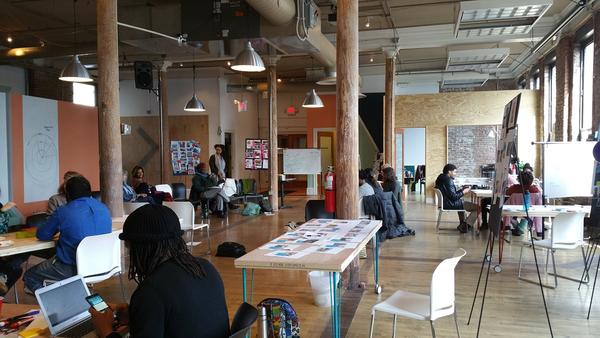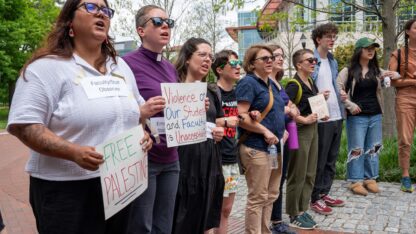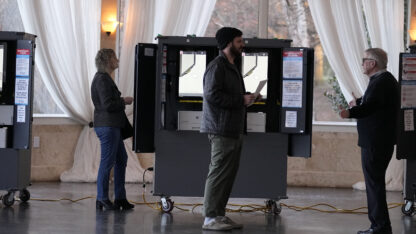Center for Civic Innovation Aims To Change Atlanta From Within

The Center for Civic Innovation opened just last year, and it has a lofty mission: “to improve the efficiency of public organizations and increase civic engagement.”
Simply put, they hope to make Atlanta run more smoothly by better connecting local problems to the people who could fix them.
Their approach takes multiple, sometimes complicated-seeming forms: developing partnerships with and between community organizations, hosting “civic labs” to help local entrepreneurs market their talents, and connecting those entrepreneurs—and their new ideas—to already existing social organizations.
Rohit Malhotra, the executive director and founder of the Center for Civic Innovation, stopped by the “A Closer Look” studio and spoke with Rose Scott and Denis O’Hayer about the center’s goals and plans for the city of Atlanta.
Rohit Malhotra speaks with Rose Scott and Denis O'Hayer.
When asked about how the center plans carry out its goal of innovating Atlanta, which already has a long history of business and civic partnerships, Malhotra admits that his organization has “never been told we’re not ambitious.”
Calling the public sector “broken,” Malhotra says there have been billions of dollars overspent on programs addressing social problems like homelessness — programs that have not made the expected progress. And in a city with the highest rate of income inequality as of 2012, Malhotra says the center is focused on seeking out new ways to address those social problems.
Malhotra makes the case that one way to harness social change is a generational shift. He says younger CEOs are looking at data differently, as a way to define problems and look toward solutions. Providing an influx of new ideas by bolstering entrepreneurs is, Malhotra says, a way to throw new solutions into the ring.
“We believe that the people who shatter the glass ceiling for the public sector are the social entrepreneurs,” he says.
As an example of one of these innovating businesses, he points to a company that sells tables and directs all the profits to the low-income men and women who build that furniture.
Malhotra, at age 28, was appointed this year as the youngest member of Board of Directors of the Metro Atlanta Chamber of Commerce. He says at board meetings he is “the disrupter in the room,” and notes that from his position he sees businesses starting to focus on improving social conditions “in their own backyards.”
The Center for Civic Innovation is located in downtown Atlanta, and last week focused on an issue arising in its own backyard: the sale of Underground Atlanta. The center hosted a town hall-style meeting for local members of the community to provide input on what they’d like to see happen with Underground Atlanta.
Malhotra says the Center for Civic Innovation is speaking with potential developers for Underground Atlanta, and one of the center’s hard rules is that the development cannot push out poverty. He says the center is determined to include the community in the early planning stages for Underground Atlanta, but acknowledges that lack of already existing information about the local community makes this planning hard.
Malhotra was raised in metro Atlanta and graduated from Emory University. He returned to the city last year after graduating from Harvard University’s John F. Kennedy School of Government, where he conducted his thesis on civic innovation in Atlanta. Information about the Center for Civic Innovation is available online at www.civicatlanta.org.
9(MDAxODM0MDY4MDEyMTY4NDA3MzI3YjkzMw004))








